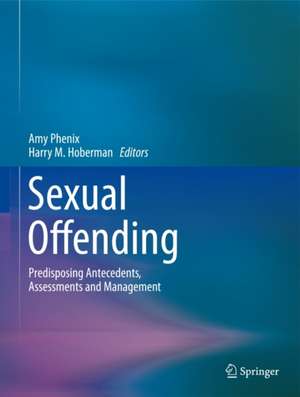Sexual Offending: Predisposing Antecedents, Assessments and Management
Editat de Amy Phenix, Harry M. Hobermanen Limba Engleză Hardback – 7 dec 2015
Among the topics covered:
- Pedophilic, Hebephilic, Rape Paraphilic Disorders and the variety of Non Contact sexual offending conditions
- Personality, related conditions, & their association with sexual offending: motivators and disinhibition in context.
- Disorders of hyper sexuality.
- Assessments of sexual offenders, including the role of psychological testing, clinical & interview approaches, as well as forensic evaluations
- Conceptual models of risk assessment & discussion of specific static, dynamic & structured clinical risk assessment approaches
- Models of & reviews of treatment outcome with sexual offenders, including psychotherapy, psychopharmacology and castration, the containment approach, civil commitment & circles of support
- Overview of public policy issues & an evidence-based perspective on sex offender registration and residential restrictions.
| Toate formatele și edițiile | Preț | Express |
|---|---|---|
| Paperback (1) | 836.39 lei 6-8 săpt. | |
| Springer – 29 mar 2019 | 836.39 lei 6-8 săpt. | |
| Hardback (1) | 1173.84 lei 3-5 săpt. | |
| Springer – 7 dec 2015 | 1173.84 lei 3-5 săpt. |
Preț: 1173.84 lei
Preț vechi: 1431.51 lei
-18% Nou
Puncte Express: 1761
Preț estimativ în valută:
224.64€ • 233.20$ • 187.31£
224.64€ • 233.20$ • 187.31£
Carte disponibilă
Livrare economică 04-18 martie
Preluare comenzi: 021 569.72.76
Specificații
ISBN-13: 9781493924158
ISBN-10: 149392415X
Pagini: 500
Ilustrații: XXV, 885 p. 32 illus., 1 illus. in color.
Dimensiuni: 210 x 279 x 58 mm
Greutate: 2.31 kg
Ediția:1st ed. 2016
Editura: Springer
Colecția Springer
Locul publicării:New York, NY, United States
ISBN-10: 149392415X
Pagini: 500
Ilustrații: XXV, 885 p. 32 illus., 1 illus. in color.
Dimensiuni: 210 x 279 x 58 mm
Greutate: 2.31 kg
Ediția:1st ed. 2016
Editura: Springer
Colecția Springer
Locul publicării:New York, NY, United States
Public țintă
Professional/practitionerCuprins
An Integrated Theory of Sexual Offending.- Part I: Disorders and Types of Sexual Offending.- Pedophilia.- Hebephilic Sexual Offending.- Rape and Paraphilic Coercive Disorder.- Drug Facilitated Sexual Assault.- Non-Contact Sexual Offenses: Exhibitionism, Voyeurism, Possession of Child Pornography and Interacting with Children Over the Internet.- Hypersexuality Disorder.- Personality, Motivators and Disinhibition in Sexual Offending.- Adolescents Who Have Engaged in Sexually Abusive Behavior: An Overview.- Female Sex Offenders.- Part II: Assessment and Risk Appraisal of Sexual Offenders.- Assessment, Diagnosis and Risk Management of Sexual Offenders with Intellectual Disabilities.- Issues and Methods in Assessment.- Clinical Strategies for Evaluating Sex Offenders.- Structured Psychological Assessment.- Psychophysiological Assessment of Sexual Preferences.- Principles and Practices of Forensic Evaluations of Sexual Offenders.- Conceptual Model of Risk versus Threat and Risk Management versus Risk Reduction.- Risk Factors and Risk Assessments for Sexual Offense Recidivism.- Overview of the Development, Reliability, Validity, Scoring, and Uses of the Static-99, Static-99R, Static-2000, and Static-2002R.- Sex Offender Base Rates of Sexual Recidivism after Controlling for Static-99/R.- The Sex Offender Risk Appraisal Guide (SORAG).- The Minnesota Sex Offender Screening Tool-3.1 (Mnsost-3.1).- Structured Risk Assessment.- Beyond Static Risk Assessments? Assessment of Psychologically Meaningful Risk Factors via STABLE-2007 and the SRA: FV.- Assessing Sexual Violence Risk and Evaluating Change with the Violence Risk Scale-Sexual Offender Version.- Structured Professional Judgment: Applications to Sexual Offender Risk Assessment and Management.- Part III: Management and Public Policy Issues Regarding Sexual Offenders.- Models of Sexual Offender Treatment.- Forensic Psychotherapy for Sexual Offenders: Has its Effectiveness Yet Been Demonstrated?.- Forensic Psychotherapy for Sexual Offenders: Likely Factors Contributing to Its Apparent Ineffectiveness.- The Containment Approach: A Strategy for Community Management of Sex Offenders.- Circles of Support & Accountability: The Role of the Community in Effective Sexual Offender Risk Management.- Pharmacotherapy for Sexual Offenders.- Surgical Castration and Sexual Recidivism Risk.- Civil Commitment of Sex Offenders likely to Reoffend.- Prosecutor; Perspective on Sexually Violent Predator Cases.- Sexually Violent Predator Law From the Defense Perspective.- Reconciling Sex Offender Management Policy, Research, and Practice.- An Evidence-Based Perspective on Sex Offender Registration and Residential Restrictions.
Notă biografică
Amy Phenix, Ph.D., is a licensed clinical and forensic psychologist in California in private practice. Her expertise includes sex offender evaluation and risk assessment. She completes evaluations pursuant to the Sexually Violent Predator/Persons Statutes and serves as an expert witness in those cases in several states with similar laws. In her capacity as a trainer she provides instruction in sex offender risk assessment, the use of the Static-99R, report writing and issues in court testimony. She has served as Consulting Psychologist for the California Department of Mental Health Sexual Offender Commitment Program from its inception in 1996 to 2008.
Harry M. Hoberman, Ph.D., L.P. is a forensic and clinical psychologist licensed in several states. While on the faculty of the University of Minnesota in the Departments of Psychiatry, Psychology, Pediatrics and Child Development, he was the principal investigator on several funded research projects related to psychosocial risk factors and mental health service utilization as well as developing and supervising psychosocial treatments. Currently, he practices exclusively as a forensic psychologist and specializes in risk assessment of violent behavior. He has contracts with various states and the Federal government to conduct evaluations and consult regarding risk assessment. In addition, he conducts forensic evaluations and provides expert witness testimony related to areas of concern. Dr. Hoberman was twice elected to the Executive Board of the Association for the Treatment of Sexual Abusers and has served on the public policy committee of that organization for over 10 years.
Harry M. Hoberman, Ph.D., L.P. is a forensic and clinical psychologist licensed in several states. While on the faculty of the University of Minnesota in the Departments of Psychiatry, Psychology, Pediatrics and Child Development, he was the principal investigator on several funded research projects related to psychosocial risk factors and mental health service utilization as well as developing and supervising psychosocial treatments. Currently, he practices exclusively as a forensic psychologist and specializes in risk assessment of violent behavior. He has contracts with various states and the Federal government to conduct evaluations and consult regarding risk assessment. In addition, he conducts forensic evaluations and provides expert witness testimony related to areas of concern. Dr. Hoberman was twice elected to the Executive Board of the Association for the Treatment of Sexual Abusers and has served on the public policy committee of that organization for over 10 years.
Textul de pe ultima copertă
This expert reference provides a broad, comprehensive review of the major domains concerning sexual offending. Beginning with a general etiological model of sexual offending, chapters follow addressing the primary predisposing conditions related to sexual offending (e.g. pedophilic, hebephilic, paraphilic rape and non-contact paraphilic disorders, hypersexuality and personality-related factors. In addition, special subgroups of sexual offenders (females, youth and the intellectually disabled) are considered. Both broad and specific perspectives on the assessment of sexual offenders are provided. Several perspectives are offered on so-called clinical evaluations of such offenders, including the central utility of structured psychological assessment approaches. A detailed chapter is provided on the principles and practices regarding the great majority of evaluations of sexual offenders that are actually forensic in nature. Considerable emphasis is focused on scientific risk assessment for sexual offending, including a novel conceptual model of risk and threat assessment. More specifically, each of the primary approaches or instruments developed for the risk assessment of future sexual offending are addressed including the “Static” risk measures, the Sex Offender Risk Appraisal Guide, forms of Structured Clinical Judgment, and varied measures of dynamic or criminogenic needs assessments. Finally, multiple aspects related to the management of sexual offenders are discussing including contemporary models of psychosocial treatments, the question of effectiveness of such treatments, biological interventions, civil commitment, circles of support and the containment approach to community management. A distinctive feature of this book is that chapters are authored by both prominent international experts and experienced; practicing professionals to best provide a breadth of useful perspective.
Amongthe topics covered:
Amongthe topics covered:
- Pedophilic, Hebephilic, Rape Paraphilic Disorders and the variety of Non Contact sexual offending conditions
- Personality, related conditions, & their association with sexual offending: motivators and disinhibition in context.
- Disorders of hypersexuality.
- Assessments of sexual offenders, including the role of psychological testing, clinical & interview approaches, as well as forensic evaluations
- Conceptual models of risk assessment & discussion of specific static, dynamic & structured clinical risk assessment approaches
- Models of & reviews of treatment outcome with sexual offenders, including psychotherapy, psychopharmacology and castration, the containment approach, civil commitment & circles of support
- Overview of public policy issues & an evidence-based perspective on sex offender registration and residential restrictions.
Caracteristici
Distils important information on legislation for sexual offenders Provides guidelines for risk assessment Connects empirical evidence to practice Includes supplementary material: sn.pub/extras








